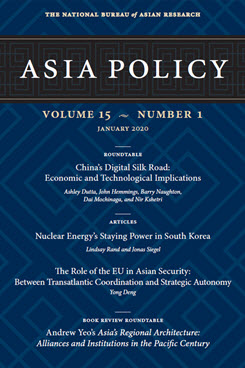Nuclear Energy’s Staying Power in South Korea
This article addresses the uncertainties of nuclear energy in South Korea by analyzing the physical characteristics of the country’s nuclear industry, its economic dependence on nuclear exports, and the political pushback to a nuclear drawdown.
EXECUTIVE SUMMARY
MAIN ARGUMENT
The Fukushima nuclear accident in Japan triggered a debate in the 2017 South Korean presidential election over the country’s reliance on nuclear energy. After winning the election, President Moon Jae-in affirmed his government’s goal to decrease nuclear energy’s contribution to total national electricity generation by halting plans for new reactors and eventually phasing nuclear energy out entirely. At the same time, the government increased its emphasis on expanding nuclear technology exports. These seemingly opposed policies have raised questions about the long-term viability of the once-burgeoning Korean nuclear industry as well as the economic and social costs of a nuclear drawdown. Nuclear power will likely contribute to the country’s electricity generation for the foreseeable future on account of the industry’s characteristics—the relative youth of the reactor fleet, the costs of early decommissioning, and the lack of alternatives in electricity generation, among others—and the political and economic tradeoffs that a significant drawdown would entail.
POLICY IMPLICATIONS
- Despite Moon’s stated goal of drawing down nuclear energy in favor of renewables, the characteristics of the South Korean nuclear and renewable energy industries suggest that nuclear power will remain a large contributor to the nation’s electricity generation at least through 2030.
- South Korea’s lack of decommissioning technologies—including those related to preparation, decontamination, dismantling, waste disposal, and environmental recovery, as well as storage and disposal of spent fuel—will limit the pace at which reactors are closed, even if reactors are taken offline early.
- Although policymakers arguing for a nuclear energy drawdown believe that they have public opinion on their side, case studies of countries with young nuclear industries suggest that public support for decommissioning is often insufficient to achieve meaningful, near-term reductions of nuclear energy in the national fuel mix.
Lindsay Rand is a PhD student in the School of Public Policy at the University of Maryland and a Research Assistant at the Center for International and Security Studies at Maryland. Her research areas include the scientific aspects of nuclear and emerging technology policies. Ms. Rand has an MS from Georgetown University.
Jonas Siegel is the Associate Director of the Center for International and Security Studies at Maryland. He was previously the editor of the Bulletin of the Atomic Scientists and is completing his doctoral dissertation on the impact of U.S. nuclear energy cooperation on nonproliferation policymaking.
About Asia Policy
Asia Policy is a peer-reviewed scholarly journal presenting policy-relevant academic research on the Asia-Pacific that draws clear and concise conclusions useful to today’s policymakers. Asia Policy is published quarterly in January, April, July, and October and accepts submissions on a rolling basis. Learn more


